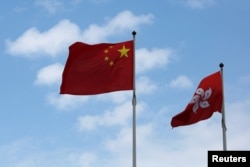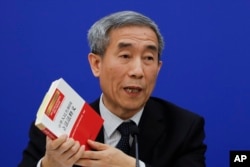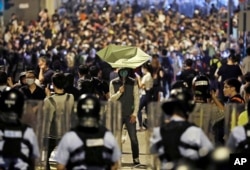China has declared that democratically elected pro-independence lawmakers in Hong Kong should not be allowed to take up their seats in the legislature, weighing in on a dispute over the way their oaths were taken during a swearing-in ceremony last month.
Two pro-independence politicians, Yau Wai-ching and Baggio Leung, draped themselves in banners that declared “Hong Kong is not China” and pledged allegiance to the “Hong Kong” nation.
It was not immediately clear how many lawmakers would be affected by the order, but Beijing’s conclusion that some are unfit for office because of the way they took their oaths has already triggered an uproar.
It is also likely to deepen divisions even further between residents of Hong Kong and Beijing, with some warning that the ruling has rocked the very foundations of the “one country, two systems” model that was set up for the port city when Britain returned the former colony to communist-ruled China in 1997.
One Country, One System
The model was set up to guarantee that Hong Kong would continue to maintain its freedoms, but increasingly China has been criticized for its heavy handed approach there and for eroding the rule of law.
A court in Hong Kong is reviewing the oath taking controversy, but China’s rubber-stamp National People’s Congress (NPC) issued an interpretation Monday of the basic law. The basic law is Hong Kong’s mini-constitution.
At a press conference in Beijing, Li Fei, chairman of the NPC’s Basic Law Committee, said the courts in Hong Kong have no choice but to carry out Beijing’s interpretation of the basic law. When asked about the threat the ruling might pose to Hong Kong’s judicial independence, he argued that it was the NPC, through the basic law, that has granted the city its judicial independence.
Li said that while the NPC’s standing committee has always supported the independence of Hong Kong’s judiciary, “there can be no judicial independence that goes against or is above the basic law.”
Lock-step response
In near lock-step response, Hong Kong officials said they would fully implement the interpretation given by the NPC, which also urged authorities to fill legal loopholes, a reference to Beijing’s apparent frustration with the fact that those advocating independence were even allowed to be elected to office.
Local residents, even those who disagreed with the way the lawmakers took their oaths, were quick to voice their opposition to the ruling and what they felt was Beijing’s interference in Hong Kong affairs. Hundreds rallied outside China’s liaison office in Hong Kong Sunday night and early into the morning on Monday, with clashes turning violent. In response, authorities deployed 2,000 police around the clock to handle “possible chaos,” according to the South China Morning Post.
“We can’t keep silence and do nothing because they are trying to suppress our basic rights,” Joshua Wong of Demosisto, the party that organized Sunday night's protest, told VOA. “Yesterday was Tibet, today is Hong Kong, and tomorrow will be Taiwan.”
As the main leader of Hong Kong's 2014 Umbrella movement, Wong says his party still considering whether to mount sustained protests like ones that paralyzed the city two years ago.
“Interpretation of the basic law by NPC Standing Committee is just trying to manipulate the constitution in Hong Kong,” he said, echoing pro-democracy lawmakers who call the damage done by the ruling “unprecedented.”
"This interpretation of the Basic Law will not just mean the two legislators, Yau and Leung lose their positions, but it will also keep people wondering whether other legislators who have taken similar oaths, will be able to keep their seats," said Civic Party Leader Alvin Yeung.
Former Hong Kong lawmaker Emily Lau said Beijing’s approach and decision to barge in and issue an interpretation before the legal system could have its say is counterproductive.
“[The decision] will aggravate many people, especially young people,” she said. “You may eject two or three members from the legislative council, but you just encourage more people to support independence.”
Politically Risky
Independence has long been a taboo topic in Hong Kong, but China has been stoking growing resentment in the former colony through its interpretations and efforts to tighten the screws on free expression there.
Some are concerned that the interpretations, Beijing’s fifth since the handover, but second since President Xi Jinping stepped into office, could become more commonplace.
Such steps by China will allow it to exert more control over Hong Kong, but its heavy handed approach is not without its risks, said Dixon Sing, a social science associate professor at the Hong Kong University of Science and Technology.
“Beijing is also taking a political risk by alerting the Hong Kong people more to the authoritarian and oppressive nature of the regime,” Sing said. But “whether the political opposition forces in Hong Kong can translate that more widespread public awareness into a stronger, united, sustained democracy movement that will be a big project.”
Yeshi Dorje of VOA's Tibetan Service contributed reporting.







